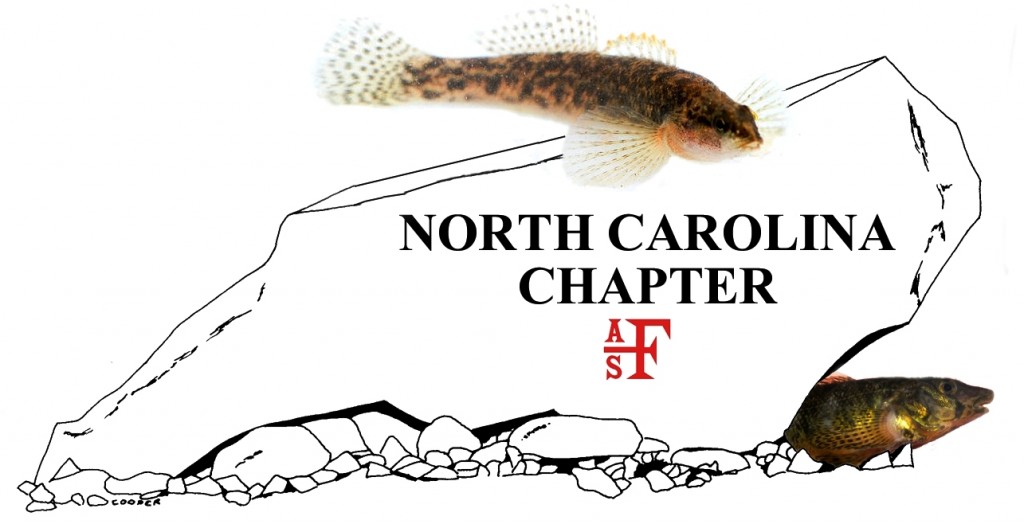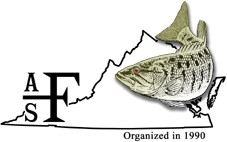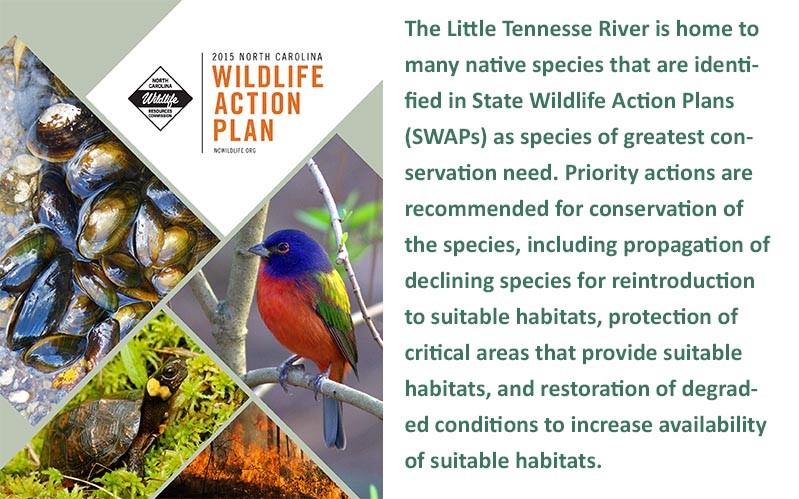Winter 2015 Newsletter
Quick Content Links
- President’s Message
- 2016 Meeting of the North Carolina and Virginia Chapters of the American Fisheries Society
- Nominations Committee and Ballot
- The Financial Health of the Chapter
- Spotlight on Students, Professionals, and Oldtimers
- Call for Chapter Award Nominations
- NCWRC Wildlife Diversity Program Quarterly Reports
- Laugh At Old Pictures Of Your Friends! New Resources, (hopefully) Easier To Find On Our Website
- NCAFS Members Collect More Awards
- Little Tennessee River Recognized for Native Fish Conservation
- Call to Action!
- Valuable Links
President’s Message
Happy New Year Everyone! As I’ve spent many days throughout the holidays wearing shorts and a T-shirt, I can’t help but wonder where this weather was when we were meeting at the beach last year. Hopefully the weather will stay mild and we’ll have easy travel during these early months of the New Year.
We’ve got two exciting meetings to look forward to. The 2016 Southern Division meeting is being held in Wheeling, West Virginia February 17th – 24th. Then, our own annual meeting will be held with the Virginia Chapter, March 15th-17th in Danville, Virginia. This is going to be a great meeting and I encourage you to register as soon as possible. This year, we are introducing lightening talks. These are 5 minute presentations that can be used to present new projects or programs, results from ongoing work, emerging issues, and other research or management briefs. I have presented in sessions that use this format before, and really enjoyed it. These sessions are fun to attend as well, because you can learn a lot about what’s going on in a short time period. There will also be a continuing education course on Genetics presented by Dr. Eric Hallerman from Virginia Tech University, as well as a catfish symposium and a symposium about the impacts and ongoing assessment/recovery actions on the Dan River.
I can’t believe my term as president is almost over. Time really does fly, and it’s amazing how much can change in 12 months. It has really been an honor and a pleasure to serve the Chapter in this way. I’ll see you at the meeting in March!
Submitted by Kim Sparks, NCAFS President
2016 Meeting of the North Carolina and Virginia Chapters of the American Fisheries Society
Announcement and Call for papers
Tuesday, March 15th to Thursday, March 17th, 2016
Institute for Advanced Learning and Research
Danville, Virginia
Joining us in Danville will be the Southeast Atlantic Slope Mollusk and Virginia Atlantic Slope Mollusk Recovery Groups. This meeting will run Monday, March 14th until noon on Tuesday, March 15th. Click here for details.
A continuing education workshop (Conservation Genetics) will be held on Tuesday afternoon, March 15th. There will be oral and poster presentations March 16th and 17th, and separate Virginia and North Carolina Chapter business meetings. Since we will be on the Dan River, scene of a major coal ash spill in 2014, we are organizing a symposium on impacts and ongoing assessment and recovery actions.
For additional information about the meeting, including how to submit an abstract, visit: http://nc.fisheries.org/2016-ncafs-meeting/.
Important dates: Submit your abstract by January 15, 2016. Authors will be notified of abstract receipt and acceptance by January 31, 2016. Abstracts submitted after the deadline may be presented as a poster.
Program Committee: Mike Gangloff (NC Chair), Craig Roghair (VA Chair), Aaron Bunch, Andy Dolloff, Eric Hallerman, Bud LaRoche, Michael Moore, Michael Perkins, and Bryn Tracy.
Submitted by Mike Gangloff, NCAFS President-Elect
Nominations Committee and Ballot
The Nominations Committee is pleased to present the 2016 NCAFS ballot for President-Elect. Chapter members running for President-Elect are NC Wildlife Resources Commission Research Coordinators Jake Rash and Corey Oakley. Please take a moment to evaluate the candidate sketches and cast your vote on the electronic ballot (link located below).
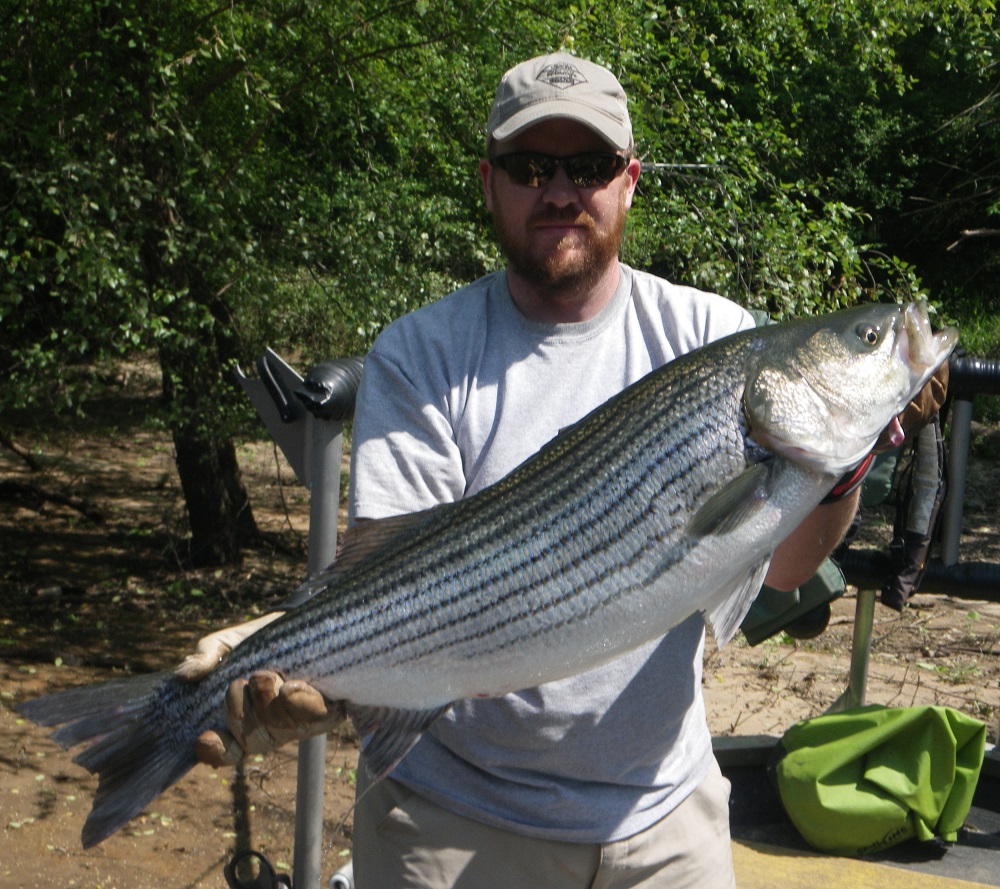
Corey Oakley
Corey Oakley is the Piedmont Fisheries Research Coordinator with NC Wildlife Resources Commission, where he has worked since 2003. His current work focuses on understanding Morone fisheries in Piedmont reservoirs. Recently, he has been working to establish a hybrid Striped Bass fishery in Lake Norman including a tag reward program to understand the exploitation rate by anglers.
Corey is a native of New Bern, North Carolina. Corey received his B.S. degree in Fisheries and Wildlife Science from NC State University in 2000 and a M.S. degree in Fisheries Science from NC State University in 2003 while studying habitat suitability for endangered sturgeon in coastal North Carolina rivers. He has been a member of NCAFS and AFS since 1999. He is currently the Committee Chair of the Striped Bass Technical Committee for the Southern Division of AFS (SDAFS) and is a certified fisheries professional. In his free time, Corey enjoys spending time with his family, fishing, and hunting.
_____________________________________________________________________________
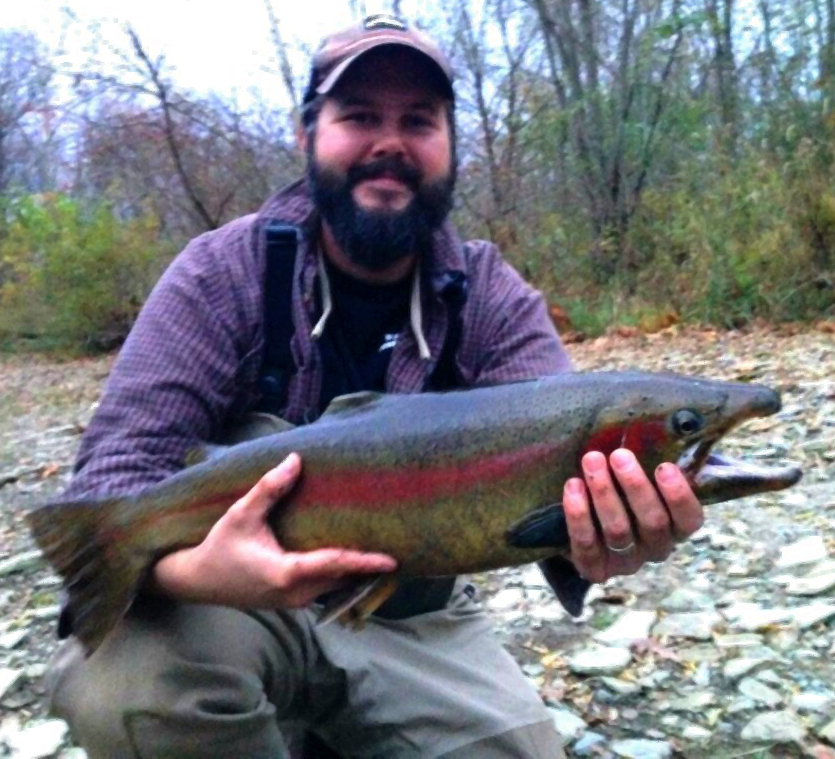
Jake Rash
Jake Rash is the Coldwater Research Coordinator for NC Wildlife Resources Commission, where he assists with the coordination of applied research and management of the State’s trout resources. He received his B.S. in Zoology from NC State University (2000) and M.S. in Fisheries and Wildlife Sciences from Virginia Tech University (2003). After graduate school, he worked with freshwater mussels as a Research Specialist at Virginia Tech until he joined the Commission.
Throughout the years he has been fortunate enough to participate in the North Carolina, Virginia Tech, and Virginia chapters of AFS, and in 2012, he served as Chair of the SDAFS Trout Committee. Although he spends his days at work thinking about fish, he enjoys spending his free time trying to find fish with monofilament and fly lines. In addition, he truly loves spending time with his family, and for reasons he struggles to understand, he continues to follow NC State athletics with an unhealthy passion.
CLICK HERE TO ACCESS THE 2016 NCAFS BALLOT
For those chapter members who vote, your name will be entered in a drawing for a 2016 AFS Parent Society membership (a value of $80).
Submitted by Brena Jones, Nominations Committee Chair
 The Financial Health of the Chapter
The Financial Health of the Chapter
As Secretary/Treasurer of NCAFS, I have been examining the financial health of our Chapter in detail. For ease of explanation, Chapter finances can be broken into three funds; (1) Robust Redhorse Conservation Committee Fund, (2) the Ichthus Fund, and (3) NCAFS Chapter Funds. Below is an explanation and financial summary for these three funds, as of early December, 2015.
- Robust Redhorse Conservation Committee = $7,174.17
Monies within the Robust Redhorse Conservation Committee (RRCC) account are for the sole use by the RRCC. The Chapter is merely a collector and disburser of such funds.
- Ichthus Fund (NCAFS Edward D. Jones Account No. 2) = $30,886.93
According to Dr. Tom Kwak, the Ichthus Fund was the result of a very generous and anonymous Duke Energy employee who wanted to donate their company stock to “support students and young professionals that are trying to get established in the fisheries profession.” When the Chapter received this stock, the EXCOM solicited advice from the Parent Society and the SDAFS on how to handle the stock donation, and both recommended against being long-term stockholders. As a result, the Chapter sold the shares in 2004 for a return of $46,387. The money was placed into a money market account with Janus Capital Group, thereby establishing the Ichthus Fund. As a result of declining interest rates, the funds were transferred to Edward Jones in 2011 and diversified into mutual funds, with the hopes of earning more income and possibly persisting for a longer period.
Since 2004, the Richard L. Noble Best Student Paper Award has been funded through this account and 12 students have each received $600 for their paper at the annual Chapter meeting. Also, 42 students have received travel awards ($340-400 each), allowing them to attend the national AFS meeting where they have presented the results of their research. The procedure and application for requesting these funds may be found at: http://nc.fisheries.org/awards/forms-applications/. The Ichthus Fund has also been used to help fund AFS’s Hutton Junior Fisheries Biology Program on two separate occasions, totaling $5,500. Lastly, to my knowledge, the Ichthus Fund has not been used to fund research or fisheries-related activities by young professionals. This might be an area for young Chapter members to explore and consider worth pursuing.
- NCAFS Chapter Funds
Checking ($5,684.76) and PayPal ($439.00) Accounts = $6,123.76
Chapter Investments (Edward D. Jones Account No. 2) = $41,784.42
The doctor’s office scale does not lie. Our piggy bank has quite the girth, especially for a Society with ca. 130 members. How is this money being managed? Should we go on a diet or harvest some of the excess biomass for barbecue? Are there opportunities for the membership to “tap into” these funds? Well, the answers are a complicated “Yes” and “No”.
The Chapter’s Checking and PayPal accounts are for paying bills (most often expenses related to the annual meeting) and these two accounts receive most of their income from membership-related dues. The monies in our Checking and PayPal accounts, as well as the Chapter’s Investments may be spent according to three guidelines detailed in the Chapter’s Procedures Manual (pp 18 and 19). These guidelines are:
“Any Chapter member in good standing or a Committee Chair may request funding provided it meets the following criteria: 1) the funding request will be used for fisheries or aquatic resource-oriented projects in North Carolina; 2) funding requests will not be used for politically-oriented activities [Note: this is an IRS exemption requirement for all 501(c)3 organizations; and 3) the funded activity is conducted through either a non-profit organization or an organization that qualifies as a 501(c)3 organization”.
Although not an exhaustive list, the Chapter has given funds to:
- Professional meetings and workshops (i.e. Southeastern Fishes Council)
- Fisheries-oriented organizations (i.e. North Carolina Wildlife Society)
- The Chapter Education and Outreach Committee’s shoreline brochure
- Shad in the Classroom
- Memorial funds
- Financial assistance for workshop instructors at NCAFS meetings
- Travel grants for Chapter members to attend AFS and SDAFS meetings
To my knowledge, the Chapter has not given out funds to fisheries or aquatic resource-oriented research. Fulfilling Criteria #1 and #2 should not be difficult to meet for most members. But, how can an individual Chapter member or group of Chapter members who are seeking funds, satisfy Criterion #3? Perhaps, the Chapter needs to re-visit the selection criteria it has established? Do we really need Criterion #3 or can exceptions be made? Can we or should we fund worthwhile projects outside of North Carolina?
So here is what the EXCOM is asking of its members:
- Please submit research or funding proposals to the EXCOM for consideration. Guidelines for submittal may be found on Page 18 in the Procedures Manual.
- If there are projects that we as a Chapter think makes sense to fund, but they do not qualify under the current eligibility criteria, then perhaps we should consider changing the criteria. What do you think? Should an ad hoc committee be formed to investigate this issue? Would you be willing to serve on such a committee?
Please send any comments on this topic to NCAFS EXCOM (me, Kim, Mike, or Brena). Thank you very much for your careful consideration of this topic and let’s put the Chapter’s piggy bank on a diet or eat some BBQ!
Submitted by Bryn Tracy, NCAFS Secretary-Treasurer
Spotlight on Students, Professionals, and Oldtimers
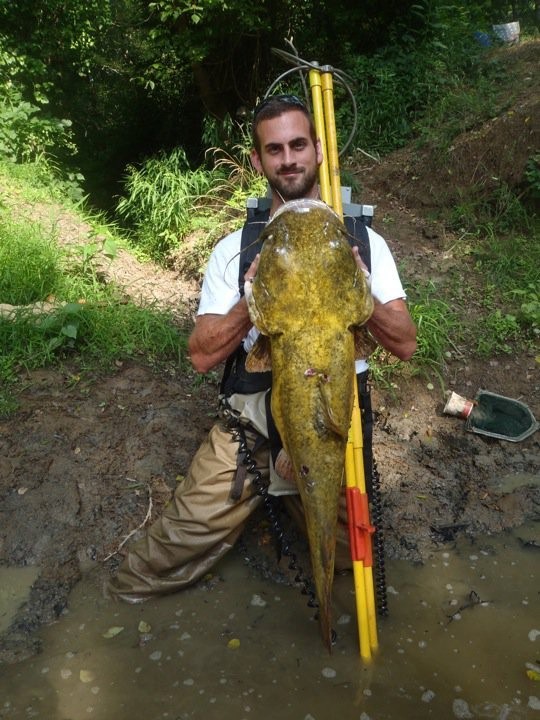
Michael Perkins on the Neuse River displaying a 35 lb. Flathead Catfish
Spotlight on Michael Perkins
Michael Perkins is the new NC Wildlife Resources Commission’s Aquatic Wildlife Diversity Biologist for the newly-formed Foothills region! He joined the crew in June 2015 and is currently working out of Marion and Black Mountain. Alongside TR Russ, he is responsible for managing the nongame aquatic fauna (fish, crayfish, and mollusks) of the Broad, Catawba, Dan, and Upper Yadkin-Pee Dee River basins in NC.
Mike grew up in Guilford County, where he spent summers looking for crayfish and fishing for bream and crappie. He moved to Boone, NC to frame houses and eventually made it to college, where he received a BS in Environmental Science and MS in Ecology and Evolution from Appalachian State University. While completing his degrees, Mike Perkins worked for Dr. Mike Gangloff and studied freshwater mussels and fish throughout the Southeast, primarily in NC, Alabama, Mississippi, and Florida. His graduate research helped to resolve the phylogenetic placement of the spinymussels, a federally endangered group. After graduating, Mike worked for USGS in Gainesville, FL but gladly accepted an offer from NCWRC to return to the mountains.
His passion has always been sticking up for the little guys, and he’s looking forward to helping protect the threatened aquatic critters in the Southern Appalachians.
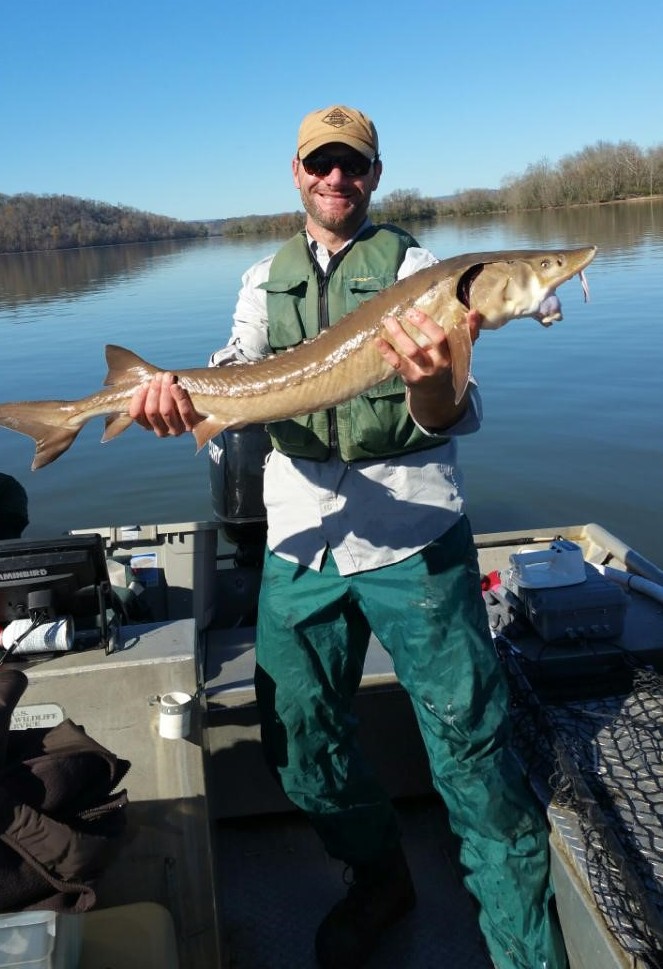
David Stagliano, with a Lake Sturgeon captured from Watts Bar Reservoir
Spotlight on David Stagliano
Dave Stagliano joined the NC Wildlife Resources Commission’s Western Aquatic Wildlife Diversity program team out of the Balsam Depot near Waynesville in July 2015. Dave comes most recently from Montana and is an aquatic ecologist with 18 years of professional experience in freshwater studies evaluating aquatic invertebrates, amphibians, mussels and fish communities for monitoring stream, wetland and river integrity. His last 15 years with the Montana Natural Heritage Program and a private consulting firm were focused on projects across MT, WY and ID, including statewide mussel surveys of Montana and in the USFS lands of north Idaho. He received his M.S. in Aquatic Ecology from Kansas State University and his B.S in Ecology from Cornell University. In between degrees, he worked at the USGS in Denver, the University of Alabama and as a field biologist for TVA. He resides in Clyde, NC and enjoys hiking, hunting, fishing, skiing and biking. We’ll see how much he enjoys the skiing on “eastern hard-pack”.
Spotlight on Fred Harris
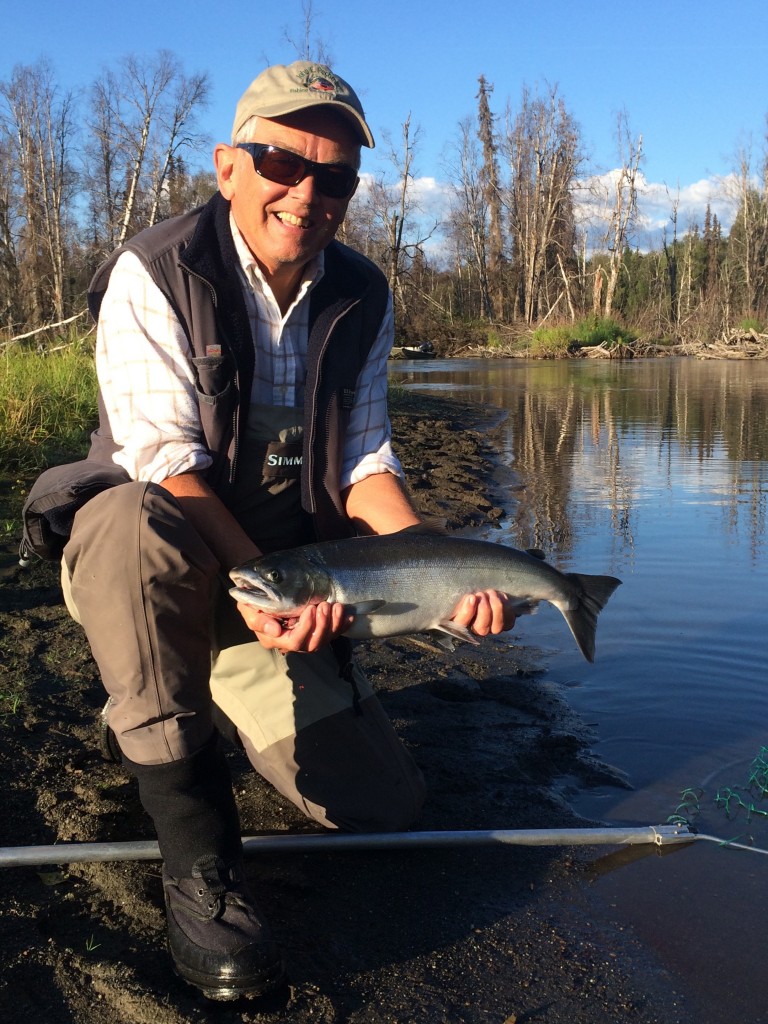
Fred Harris, with a memorable catch from a recent fishing trip in Alaska
Since retiring from the NC Wildlife Resources Commission’s in 2008, Fred has managed to stay involved in fish and wildlife conservation. Shortly after retiring, he accepted a natural resources specialist position with the NC Wildlife Federation (NCWF). NCWF is engaged in several issues regarding fish and wildlife conservation in North Carolina and Fred has been privileged to work on several of these. Among those issues are protection of isolated wetlands, conservation of numerous marine fishes, deer farming, red wolf conservation and development of forest management plans. A major focus area for Fred has been the Little Tennessee River Native Fish Conservation Partnership, a collaboration among numerous agencies, organizations and corporations within the three states that contain the Little Tennessee River system. Native Fish Conservation Areas are river basins managed for the conservation and restoration of native fish and other aquatic life, as well as compatible recreational and commercial uses. They represent a non-regulatory, collaborative approach to native fish conservation incorporating biological needs and local community values. The mission of the partnership is to promote the conservation and restoration of habitat in the Little Tennessee River Basin for the benefit of native fishes and other aquatic wildlife. In 2015 the Little Tennessee River was designated as the nation’s first Native Fish Conservation Area (see article on page 13).
Since 2012, Fred has served on the Sport Fishing and Boating Partnership Council representing AFS. The Council is chartered under the Federal Advisory Committee Act for the purpose of advising the Secretary of the Interior, through the Director of the Fish and Wildlife Service, on aquatic conservation endeavors that benefit recreational fishery resources and recreational boating and that encourage partnerships among industry, the public, and government. Significant Council activities include a programmatic assessment of the Recreational Boating and Fishing Foundation, a Strategic Vision for Fish and Aquatic Resource Conservation in the Fish and Wildlife Service, recommendations for incorporating fishing and boating in the strategic plan of the National Wildlife Refuge System and recommending that Secretary Jewell encourage responsible federal agencies to improve interagency communication and coordination concerning permitting procedures for water-based infrastructure essential to recreational boating and angling.
Fred continues to serve on the Board of Directors for the Fisheries Conservation Foundation. The Foundation is involved in numerous aquatic conservation endeavors including native fish conservation areas.
Finally, Fred says he has enjoyed having opportunities to read on subjects that happen to interest him and to spend time with friends fishing and lying about the ones that got away.
Special thanks to the spotlightees, as well as TR Russ and Steve Fraley with NCWRC
Call for Chapter Award Nominations
The Chapter presents two awards on an as-warranted basis to recognize outstanding contributions by both chapter members and others. The Jerry R. Finke Distinguished Service Award recognizes Chapter members who have distinguished themselves by service to the Chapter, the AFS, or the fisheries profession. The Fred A. Harris Fisheries Conservation Award recognizes non-Chapter members who have distinguished themselves by service or commitment to the Chapter or the fisheries and aquatic resources of North Carolina.
The Awards Committee is soliciting nominations from the membership for both of these awards for 2016. If you are aware of a deserving individual or organization, please nominate them! Nomination letters should be no more than two pages long and provide specific information on the accomplishments of the candidates and why they qualify the candidate for the award. Qualifications for the Distinguished Service Award should extend beyond simply doing an outstanding job on regular chapter duties (e.g., officer or committee member responsibilities) and be based primarily on extraordinary efforts or new initiatives.
Please submit nominations to John Crutchfield at [email protected], Duke Energy, 526 South Church Street, P.O. Box 1006, Mail Code EC12K, Charlotte, NC 28201-1006. Nominations will be accepted until Monday, January 25, 2016. If you have any questions, please call John at 980-373-2288.
The chosen recipients will receive the awards at the joint 2016 NCAFS-VAAFS annual meeting to be held in Danville, VA, on March 15-17, 2016.
Submitted by John Crutchfield, NCAFS Awards Committee Chair
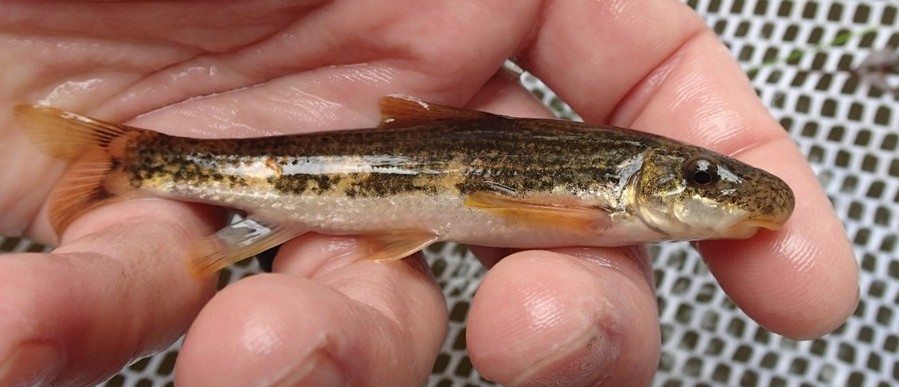
Rustyside Sucker from Little Dan River, NC
NCWRC Wildlife Diversity Program Quarterly Reports
The link below provides information on NCWRC’s quarterly wildlife diversity reports, which contain updates on a wide variety of nongame research projects and survey results.
Wildlife Diversity Quarterly Reports
Be sure to check out recent articles on priority fish monitoring in the Dan River Basin, and augmentations of Yellow Lance, Tar River Spiny Mussel, Cape Fear Shiner, and Robust Redhorse.
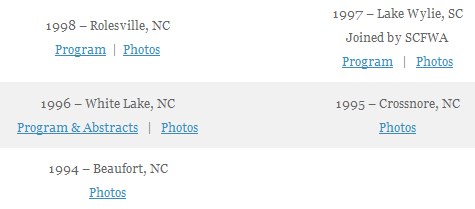 Laugh At Old Pictures Of Your Friends!
Laugh At Old Pictures Of Your Friends!
New Resources, (hopefully) Easier To Find On Our Website
- Thanks to an archaeological scanning adventure from our resourceful Secretary/Treasurer, Bryn Tracy, a series of photo collections from the NCAFS 1994-1998 Chapter Meetings is available for your entertainment and purview. You can find a .pdf document per year on our “Programs & Podcasts” page; simply scroll down the table and click the “Photos” link of your choice to enjoy. Please feel free to contact your webmaster ([email protected]) if you’d like to help add names to faces. We’re also still looking for a copy of the 2010, as well as 2003 & earlier, Chapter Meeting programs: if anyone has paper, electronic or photographic evidence, I’d be happy to round out the collection!
- Our homepage menu bar has been slightly adjusted to better guide you to the excellent documents produced by membership, as well as reference material. Under the new “Publications” heading, you will find a drop-down including our newsletter archives, our Procedures and Bylaws, and a fresh Special Publications page, to be curated as it grows. The latter includes Bryn Tracy’s comprehensive status report of NC Imperiled Fish Species and additions may be submitted to EXCOM or the Communications Committee for review and inclusion.

Submitted by Brena Jones, NCAFS Webmaster
NCAFS Members Collect More Awards
Recently, the North Carolina Wildlife Resources Commission’s (NCWRC) Division of Inland Fisheries announced the hardworking recipients of their 2015 special awards. We wanted to highlight two of the recipients, who are also longtime contributors to NCAFS.

Chris Goudreau
Career Achievement: Chris Goudreau
Chris has represented the Commission’s mission and goals in the FERC process, actively engaged partners in developing policy for ecological flows, and actively participated in the Aquatic Nuisance Species (ANS) Steering Committee. Chris was instrumental in the development of long-term and time intensive settlement agreements for several hydropower licenses in NC and he is a staunch advocate for the protection of fisheries and wildlife habitat and providing access for sportsmen. Within the North Carolina portions, the agreements have resulted in long-lasting resource benefits to large reservoirs, significant riverine reaches, and thousands of acres of upland habitat.
In Chris’s most recent role as Special Projects Coordinator, he has represented the needs of wildlife resources and all agency programs by bringing a reasoned but persuasive voice to policy development and planning arenas. As a member on the ANS Steering Committee, Chris was instrumental in pulling species-specific information together along with researching and assessing other state’s ANS plans to ensure North Carolina’s ANS plan was relevant and accounted for the lessons learned. In all cases, Chris has been viewed as a group leader to balance important natural resources with competing demands. Through his thoughtful coordination with Agency staff, commitment to collaborate with partners, and incredible attention to detail, Chris has been able to secure numerous benefits for North Carolina’s wildlife resources. Through this collaboration and foresight, Chris has had a hand in influencing a legacy of important studies and habitat improvements for North Carolina rivers, which include the development of a natural flow regime, monitoring of biotic response, and aquatic restoration funds.
Perhaps Chris’ greatest contributions to the Agency and the aquatic resources of our state have come through his efforts to improve environmental flows in rivers and streams across the state. He has served several years on the Instream Flow Council (IFC), which is a professional group of fish and wildlife agencies working to improve the effectiveness of instream flow programs for the conservation of fish and wildlife and related aquatic resources. Chris served as the IFC Region 3 Director from 2002-2004, as the IFC Secretary-Treasurer from 2004-2008, and as the IFC President from 2010-2012. Chris has led efforts to develop the Southern Instream Flow Network, supporting other state programs in the region by sharing expertise and experience, along with development of a research agenda. Recently, Chris represented the Agency on the Ecological Flows Science Advisory Board in a collaborative effort to assess scientific approaches for managing stream flows in NC riverine systems while improving our understanding of the ecological effects of altered stream flows on aquatic communities.
Through all of these efforts, Chris continued to look for ways to thread a needle among stakeholders and look for opportunity to share his instream flow knowledge and vision for fish and wildlife resources. His efforts and dedication to address issues ranging from the technical field of instream flow to shoreline management to upland habitats will have a lasting impact on fish and wildlife conservation at the state, regional and national levels for years to come.
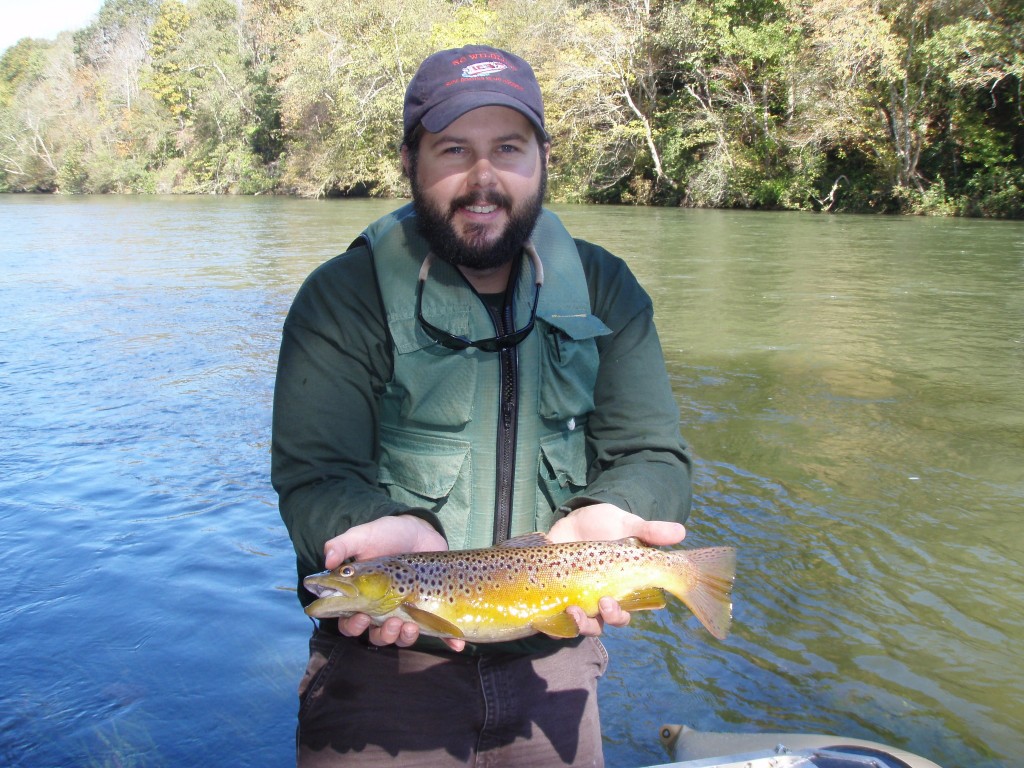
Jake Rash
Biologist of the Year: Jake Rash
In 2015, Jake contributed significantly to the Division’s coldwater management program. Specifically, Jake was largely responsible for utilizing Agency human dimensions staff to generate an unprecedented level of stakeholder input to update the Trout Management Plan. Jake also spearheaded efforts to utilize remote sensing technology to re-develop the agency’s long-term trout monitoring program, the utilization of state-of-the art genetics technology to identify unique population characteristics of North Carolina’s wild Brook Trout populations, and for making strides in disease detection in wild trout populations.
Jake also spearheaded Agency efforts that identified the presence of two significant trout pathogens, gill lice and whirling disease. Throughout the chaotic process, Jake was instrumental in developing a coherent internal sampling approach, but more importantly, he also created an immediate open dialogue with other coldwater managers across the U.S. which allowed the agency to proceed with greater efficiency and avoid many pitfalls. Jake also realized the research potential these unfortunate episodes will ultimately create and began brainstorming research ideas that will have direct and immediate management application.
Jake has also been extensively involved in efforts outside the Agency, including a leading role in the Eastern Brook Trout Joint Venture, a fish habitat partnership that has brought an unprecedented approach to management of Brook Trout resources in the eastern United States. Further, Jake’s involvement in the continued success of the Wild Trout symposium and has kept Agency Brook Trout management efforts in the forefront nationally. Jake has also gone above and beyond in the development and culture of personal relationships with organized angling groups, particularly Trout Unlimited. Thanks largely to Jake’s efforts, the Commission’s trout management program is recognized nationally, by both management agencies and angling groups, as one that effectively balances protection and enhancement of wild trout resources with unique approaches to meet constituent and community desires to fish for stocked trout resources.
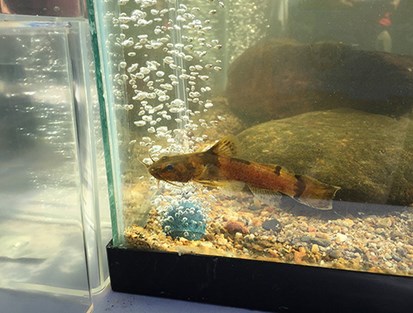
Yellowfin Madtom, a federally Threatened fish, was released into Abrams Creek at the designation event. Photo by Andrea Leslie/NCWRC.
Little Tennessee River Recognized for Native Fish Conservation
The news release below is a reprint from an article by Gary Peeples, USFWS.
Tallassee, TN (Oct. 14, 2015) – Recognizing its incredible diversity of stream life and years of efforts to conserve that diversity, the Little Tennessee River basin has been designated the nation’s first Native Fish Conservation Area.
“The Native Fish Conservation Area designation reflects an integrated and cooperative approach to stream conservation,” said Trout Unlimited’s Damon Hearne. “We’re recognizing the importance of these streams to the region’s identity, and we’re committing to a collaborative approach to stream conservation that looks at the entire river basin, and incorporates biological needs and local community values into river management.”
In 2008, Trout Unlimited, Federation of Fly Fishers, and the Fisheries Conservation Foundation came together to develop a new way to approach native fish conservation on a large scale, based on coordination at local, state, and federal levels while recognizing the importance of recreation and multiple economic river uses. The result of that meeting is the Native Fish Conservation Area designation. Native Fish Conservation Areas (NFCAs) are river basins with a focus on stream management for the conservation and restoration of native fish and other aquatic life, paired with compatible recreational and commercial uses, with the end goal of ensuring the long-term survival of native aquatic species. The North Carolina Wildlife Federation brought the concept to North Carolina and was instrumental in identifying the Little Tennessee River basin as a conservation area.
The Little Tennessee River basin stretches from North Georgia, across North Carolina, and into Tennessee, and includes the Little Tennessee, Tuckasegee, Oconaluftee, Nantahala, Tellico, and Cheoah Rivers, along with all their tributaries. It’s home to more than 100 species of fish, and 41 aquatic animals considered rare at the federal or state level, including a handful found nowhere else in the world such as the Citico Darter, Smoky Madtom, and Little Tennessee Crayfish.
“This designation highlights what a lot of folks who work in river conservation have known for years – the Little Tennessee River has an incredible diversity of life and has been the scene of myriad efforts, many groundbreaking, to conserve that diversity,” said the North Carolina Wildlife Federation’s Fred Harris, who was instrumental in bringing this designation to the Little Tennessee River basin.
Many groups have been working to conserve aquatic wildlife in the Little Tennessee for years and this NFCA designation seeks to coordinate and reinforce that work. NFCA partner organization have carried out many conservation projects:
- Reintroduction of four endangered fishes into Abrams Creek, Great Smoky Mountains National Park;
- The reintroduction of four endangered fishes into Tellico River, Cherokee National Forest;
- The return of water to a previously dewatered stretch of the Cheoah River;
- The return of the threatened Spotfin Chub to the Cheoah River;
- Boosting the numbers of Appalachian Elktoe mussels in the Cheoah River;
- Removal of the Dillsboro Dam from the Tuckasegee River;
- Captive rearing and stocking of the rare Sicklefin Redhorse;
- Conservation of the Needmore Tract on the Little Tennessee River;
- Stream-based field trips for hundreds of middle school students across the basin;
- Reconnection of aquatic passage for Brook Trout and other cool-water species by means of small dams and culvert removal.
“Our expectation is that the designation will bring attention to the streams of this river basin, the communities along the river banks, and opportunities to conserve and enjoy these waters,” said Jason Meador of the Land Trust for the Little Tennessee. The designation is supported by the Little Tennessee River Basin Native Fish Conservation Partnership, which includes American Rivers, Conservation Fisheries, Inc., Eastern Band of Cherokee Indians, Georgia Department of Natural Resources, Land Trust for the Little Tennessee, National Park Service, NC Wildlife Resources Commission, Sierra Club – Tennessee Chapter, Tennessee Department of Environment and Conservation, Tennessee Valley Authority, Tennessee Wildlife Resources Agency, Trout Unlimited, US Fish and Wildlife Service, US Forest Service, and Watershed Association of the Tuckasegee River.
Contacts:
Andrea Leslie – NCWRC, [email protected], 828/558-6011
Damon Hearne – Trout Unlimited, [email protected], 828-398-0177
Stephanie Chance – USFWS, [email protected], 931/528-6481
Call to Action!
If you want to contribute, have a story idea or would like us to include something in next quarter’s newsletter, email Kevin Hining [email protected] or give him a call at 336-877-1087.
Also, if you want to become more involved with one of the many great NCAFS committees then please check this link for information about each one, contacts, etc., http://nc.fisheries.org/who-we-are/committees/
 Valuable Links
Valuable Links
The American Fisheries Society Home Page offers a wealth of links to assist you in your fishy endeavors. Information on ordering AFS books, public outreach, annual meetings, chapter links and joining the AFS can be found there.
This and archived NCAFS newsletters, along with links, chapter information, and upcoming meetings, can be found on our own website.


